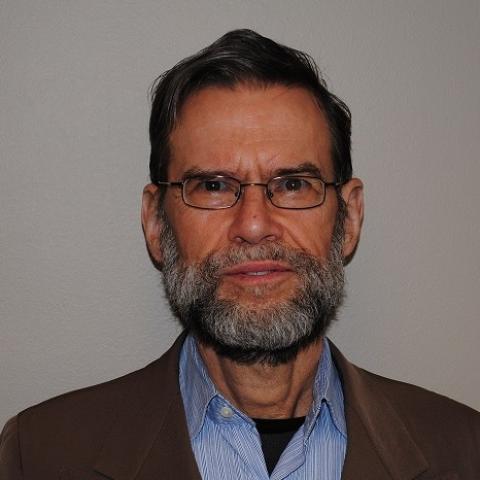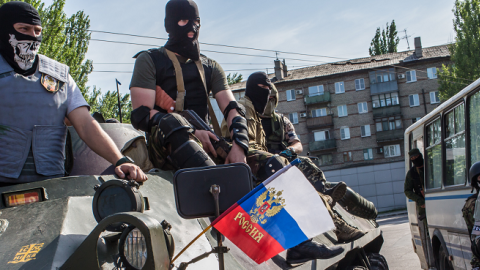In our eagerness to paralyze ourselves over Ukraine, we have been repeating the incantation, “Putin has all the cards...all the levers....” Believing this, we tend to think only we, the Americans and Europeans, can stop him, and only by World War III, which we don’t want. So we do very little.
But does Putin have all the cards he needs? The most powerful man in the provinces he wants to tear away, the steel billionaire Rinat Akhmetov, just issued a formal declaration that “I strongly believe that Donbass can be happy only in united Ukraine.”1 About the option of an “independent” Donetsk People’s Republic, Akhmetov said “no one in the world will recognize it. We will fall under enormous sanctions, we will not be able to sell or produce.” Of the option of union with Russia, he said the same, and “From this neither Russia nor the Donbass [the industrial area now contested] will win.” Instead, Akhmetov came out for “decentralization,” the Kiev government’s new formula. While his statement was carefully constructed to consider Russia’s welfare, and avoided any expression of Ukrainian patriotism, Akhmetov essentially declared against Putin’s surrogates.
But this is the man from whom, according to the secessionist “Governor of Donetsk,” Pavel Gubarev, “two-thirds of the [pro-Russian military] activists were already getting a salary. A very small group of persons remained faithful to the [Russian nationalist] idea...”2 Akhmetov followed his YouTube statement by sending tens of thousands of workers on his payroll to patrol the streets and clear away, in at least some places like Mariupol, the barricades erected by the pro-Russians. Akhmetov thus crippled the secessionist side at the decisive moment—just when his betrayal of the movement he’d previously funded would earn maximum gratitude in Kiev. While this is only one step in a series of maneuvers and intrigues we can’t yet fully predict or interpret, Akhmetov’s motives are obvious. He surely hates the new Kiev government, which overthrew his man Yanukovich. But such an oligarch is accustomed to making Presidents, not cowering before them in the manner Putin prefers and demands. Akhmetov’s interest lies in preserving his stronghold relatively free from either side’s pressure or influence so he can continue to make money unrestrained by law.
Even before Akhmetov declared himself, Putin’s strategy for carving up Ukraine was not working too well. The referendum planned for Sunday, May 11, yielded predictable, Soviet-style majorities: proponents of Ukrainian unity stayed home en masse, open polling stations were hard to find in some areas, but secessionist control of the ballot canvass assured an overwhelming “pro” vote just the same.
Having “won” this referendum, what to do with it? Putin lacked easy means of consolidating its “verdict” by force. Russian troops had earlier and effortlessly seized Crimea from long-established, well-maintained garrisons within that region’s borders. But no such garrisons were pre-positioned and already available in the rest of Eastern Ukraine. So there, a different sort of campaign would be required.
Putin had begun this campaign on April 7 with moves against Eastern Ukraine’s three great industrial cities, each with a population of more than a million: Kharkhiv, former capital of Soviet-era Ukraine, and the steel-producing centers of Donetsk and Luhansk. The strategy relied almost entirely on symbolism: seizures of isolated but high-profile public buildings designed to convey an impression of “popular uprising” and desire for “change of administration.” In Kharkhiv, however, these takeovers were rather quickly reversed, while in Donetsk and Luhansk control of the targeted properties shifted back and forth, their would-be occupiers—the Akhmetov-network proxies Putin seems to have been relying upon—sitting in the buildings until challenged, but unwilling or unable to do much else. And all the while, across much the rest of its eastern provinces, the Ukrainian government’s administrative bureaucracy continued to function without interruption.
It was disappointment with this situation that appears to have prompted Putin (on April 12) to shift his attention away from Eastern Ukraine’s major cities and instead deploy professional fighters against a scattering of smaller, ruined industrial towns in which the Soviet past and its loyalties have greater purchase. Reports are conflicting, but this revised strategy, too, seems to have produced middling results; only in Sloviansk do Russian “militants,” directed by Russian intelligence agents and special forces, appear to control the entire city and effectively direct its affairs. In many places, Russian-sponsored crowds—a mixture of random local enthusiasts and rent-a-mobs—have managed to do little more than hoist a few secessionist flags and erect a few “roadblocks” of scattered old tires. The trouble with rent-a-mobs, of course, is that others can rent them too.
Putin’s imitation of mass rebellion in Eastern Ukraine is not sputtering because of popular loyalty to the new government in Kiev. Careful polls conducted by the International Republican Institute and Pew suggest the government remains tremendously unpopular throughout the Russian-speaking southeast, a problem that democrats in Kiev must still confront. But hostility to Kiev appears detached from any particular political project. Outside of Mariupol, Akhmetov’s attempted mobilization has also proved disappointing. Which is not surprising: 70 years of frenzied exhortation and fake public spirit under Soviet rule have left ordinary Ukrainians exhausted by—and profoundly disgusted with—politics of any sort. Politics feels like something remote, dark, and filthy, a game played by unknown manipulators for obscure but surely selfish reasons. So in the post-Soviet context it is hard to mobilize Ukrainian citizens even for politicians they generally sympathize with.
Against this background of widespread public indifference, then, what exactly happened to abort Putin’s offensive and turn Akhmetov against him? It was probably Kiev’s renewed effort—through active military deployments—to assert its practical authority in the region. Ukrainian military movements were very hesitant and muddled, but they were enough to arrest an expansion and consolidation of Putin’s simulated popular “rebellion”—which Russia could then have “acknowledged” and “defended” with a formal incursion of regular troops. The fakery and empty symbolism of this rebellion having thus been exposed, and any plausible rationale for “humanitarian intervention” consequently evaporating, Putin was forced to make a decision: either pursue his designs on Eastern Ukraine by means of an undisguised cross-border invasion, or shift tactics. For the moment, at least, he appears to have chosen the latter option. Ukrainian soldiers, risking their lives with little confidence in their own government—and with no help at all from ours—have rescued their nation’s unity.
Temporarily. Ukrainian military action was desperately necessary. But the men who carried it out remain poorly trained, and poorly led—and are continuing to operate in a tense and confused environment that might yet dissolve into “us-or-them” communal violence. It is never easy for any army, including ours, to impose its will by force without simultaneously killing civilians left and right. And at present, the Ukrainian armed forces are especially ill-positioned for such a task. That means things are still dangerous and Kiev still needs our help: serious training and some ancillary materiel support, not necessarily “lethal,” for its military and police forces.
There are obvious precedents for such aid. The Clinton administration, far more serious than Obama’s, began a Georgian Train and Equip Program (GTEP) that was expanded by George W. Bush. It gave Georgia a real army, the indispensable attribute of any modern state. Without that military training, what is now going on in Eastern Ukraine would have been going on in Georgia ever since the 2008 war; the country would long-since have disintegrated into failing feudal statelets. Likewise in the Bosnian-Croatian conflict, the real turning point against Milosevic’s aggression was not NATO’s air campaign, but the successful 1995 offensive by a newly professionalized Croatian army. And that newly professionalized Croatian army was the consequence of a Defense Department-sanctioned training program conducted by retired U.S. military officers.
A limited popular appetite for rebellion and secession, the decision by local oligarchs to give up secession once their interests were safe, and the rickety security forces of a rickety new democracy have combined to put a temporary brake on Vladimir Putin’s imperial ambitions in Eastern Ukraine. But he surely has not given up, and when next he tries, he will surely be ready with something more and better than the rent-a-mobs that failed him last time. To deter and respond to such a threat—to defend Ukrainian freedom against a tyrant bent on snuffing it out in defiance of every international norm—Kiev will obviously need something more and better than what it has right now. The Ukrainians have been urgently begging for this kind of help for quite some time now. It is well within our capacity and competence to provide that help. Putin has shown he is not a superman. And yet we dawdle on and on....
Our leaders are displaying the psychology of hopelessness. In V. S. Naipaul’s great novel about the ambiguous decline of the West, The Enigma of Arrival, he notices, in a failing tourist shop, that the owners don’t even want to see customers walk through the door. Real customers simply remind them of their fruitless struggle to make the business pay; sweeter to yield to despair. Is that what we want to do?



















